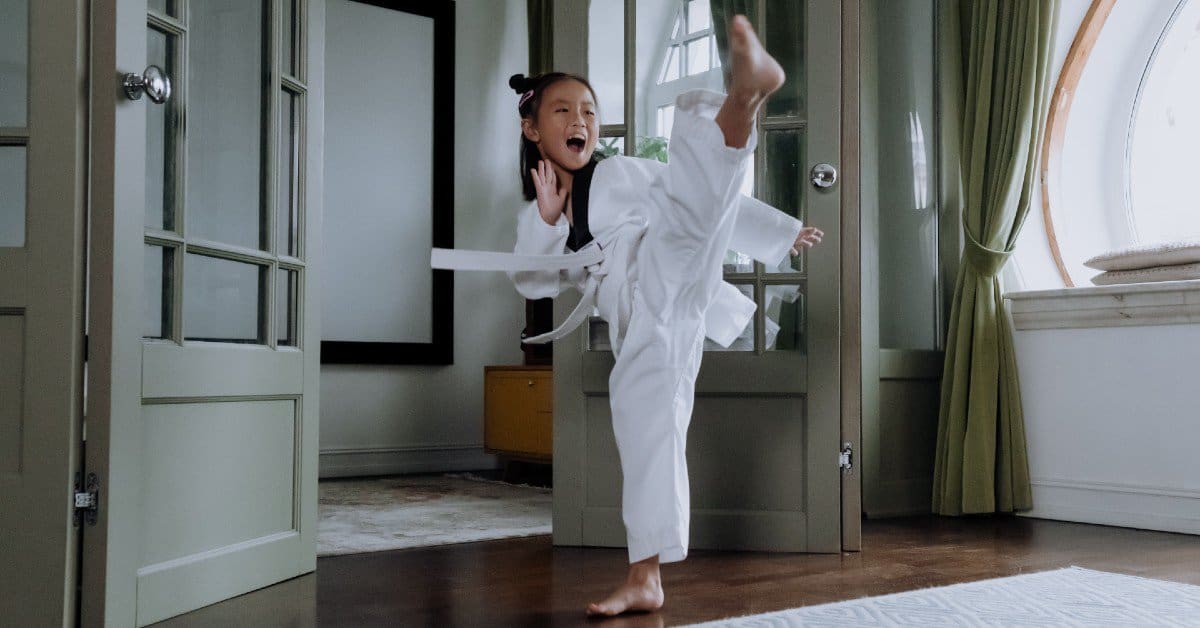One of the absolute most frequently asked questions online concerning karate training is whether it can be learned at home or not. Very many people do not have either the financial means necessary to sign up for karate training, or they just don’t have a dojo nearby where they could learn. Many of these people are very passionate about training karate, just have no way of doing so in the optimal conditions, like in a dojo. But is all hope lost for the people who don’t have access to a formal way of training? This is the question we want to answer in today’s article: can you learn karate at home?
You can learn karate at home. However, do not expect to become an expert or even moderately good at the art, especially not if you don’t at least have a sparring partner.
We won’t lie, unfortunately, there is no good way to learn karate except for somebody who is already good at it, like an instructor or a master. However, that doesn’t mean that you don’t have any options regarding karate training or getting involved in the karate world whatsoever. There are a couple of things that you can do in order to start your training at home, but we warn you, it isn’t easy. Read on to find out more about learning karate at home!
How to Learn Karate at Home?
So, first of all, we want to clarify that there are many things you won’t be able to learn at home and even the ones you do, you most probably won’t learn them properly. The reason for this is that even though a lot of karate knowledge, techniques, strikes, punches, and else are recorded on video and in books, there is nobody who has actively learned these from some master who can judge whether what you do is good or not. A book or video has a finite amount of information that cannot go on tangents and explain things you don’t understand.
Take a simple kick for example. In a video, you can see it being executed, you can hear the instructor tell you how it should be done, but it is highly likely that they won’t explain all the parts of it that interest you since they take some aspect of the technique as being self-evident. Maybe they don’t elaborate on the stance you should start the kick from, or in what situations it can be used, perhaps which Kata contains it. The only reason it is possible to be able to somewhat learn karate online is that you can type every single one of these questions into the internet and get back more information that you can consume in a month.
Even with the abundance of material to learn from, the lack of physical contact and the analysis of a master or instructor makes it much harder to properly learn the art. However, the single best thing you can do if you cannot train in a dojo is to get a training partner. The reason for this is that though you might be able to learn karate at home and outside of a dojo, you most definitely cannot learn it on your own or with a punching bag. It is an art which has to be actively trained with a person, otherwise, you will have no idea which parts of it can actually be used and how those parts should be executed in actual sparring or fighting scenario.
So, now to learning karate at home. The first step is to have a space where you can practice. You quite simply cannot practice karate in a small space where you can easily harm yourself or the things around you. You need enough room to be able to take a couple of steps in any direction. If you end up training katas or larger moves like kicks and the like, you need to be able to execute them without having to worry about breaking things around you. Aside from this, obviously, you will need some sort of training gear which is comfortable enough for you to move around in it and train. After a certain amount of time, you might need or at least want to perform splits and high-kicks, so you really do need clothes that won’t restrict your movement.
First, you will have to start with research. Look at this as the foundation of your learning, just like an instructor or a master knows a lot about the art you are teaching, you also need to learn something about the art you want to study to be able to start training in a specific direction and not just fool around pretending you are Burce Lee.
You need to look into the origin of karate a bit, so that you know whether the history, philosophy, function, and utility of it work for you or not. We will assume this part you have already done, otherwise, you wouldn’t be looking at ways to train karate at home. The next thing you have to look into is the general style you want to practice. There are many different types of karate, like Shotokan, Kyokushin, Goju-Ryu, Uechi-Ryu, and a lot more. You need to decide which one feels the best for you and fits your needs best, and then you can look into the actual training regiment.
Look at this whole prepping process as if you were zooming in on something with a camera lens. In order to get more and more specific about what you want to do and how you have to do it, you first have to see the surrounding context and then zoom in, just like with a camera. The next stop when zooming should be deciding within that style, which direction or school you want to follow, since there are multiple types. We suggest trying to find either a course or at least just one source from where you will take the information for your learning process, since this way you know you aren’t skipping anything or learning something useless.
Now that you know what you want to study, you just need to start actually doing it. There are certain things you can learn all by yourself, such as the basic stances, punches, and kicks. This is called Kihon, the fundamental building blocks of karate. They are like words in a language, they are what you use later on in combinations to put together katas and to train Kumite. What really helps with learning the basics is to take your standard source of information, learn it as best as you can (possibly have a mirror where you can see whether you are executing it properly, or perhaps record your training on video), and then see other sources, videos, books, blogs and whatever you can find, to possibly find things you can use to expand your knowledge about that given basic movement.
Learning the basics, and actually learning anything at all from karate will be very hard if you are training at home, so be prepared for a challenge. The largest challenge isn’t the movements actually, but much rather the fact that most people give up after a couple of sessions just because they cannot handle the extra workload of researching the thing they want to learn and then trying to learn it, and at the end to even try to evaluate whether they did it properly or not. WHen learning karate at home, you are trying to be both your master and pupil, which is hard.
If you have managed to build a good routine and regiment which will allow you to train the art for a prolonged period of time, and the system is also good enough to ensure that the things you learn are useful and genuine, it is time to think about sparring and sparring partners. If you want to learn karate, you cannot do so without a sparring partner. Thus, if you want to go beyond the very basic punches, kicks, blocks, and sequences (katas), you need to find a training partner who is willing to do sparring practice with you.
The hardest part of this is finding someone who has the same interest in karate as you do, since having a sparring partner who knows nothing about karate won’t help you too much when you are still a beginner, trying to learn karate in the first place. In some sense, it might be beneficial, since you can try the effectiveness of the things you have learned against the “average Joe”, but in the beginning, it is much better to have a partner who you can focus on karate with, instead of the effectiveness of what you are learning.
We do recommend trying your best to train in a dojo under instructors and masters since you will learn a lot quicker and much better as well. However, if you do not have the chance to do so, we hope that this article can help you enough to start training and to start developing some sort of a karate-training regiment.
Below, you can find our recommendations for each piece of equipment for karate. Check it out if you decide to start!

